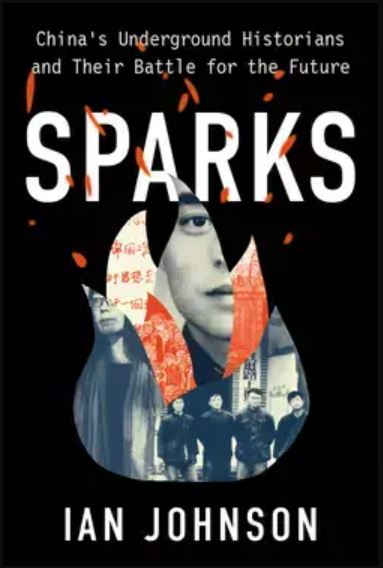It’s become common knowledge that Xi Jinping has cracked down on Chinese civil society and independent analysis, tightening the Chinese Communist Party’s control over academics and schools throughout the country. Yet, even now, the CCP does not have absolute control over Chinese society.
In his new book, “Sparks: China’s Underground Historians and their Battle for the Future,” veteran China journalist Ian Johnson details the stories of what he calls underground or counter-historians, people who challenge the CCP’s historical narrative. Johnson notes that since the party’s very inception, it has been obsessed with controlling the official history – and for just as long, there have been courageous independent thinkers who collect evidence and come to their own conclusions. In the digital age, despite China’s much-vaunted censorship apparatus, this sort of research can be shared more widely than ever before.
The Diplomat’s Shannon Tiezzi interviewed Johnson, currently a senior fellow for China at the Council on Foreign Relations, via email about the “sparks” keeping historical research alive in China, and the implications for Chinese society today and in the future. These counter-historians, Johnson says, share “a fundamental belief that regardless of what direction China takes in the future, a more just and moral country cannot be based on historical lies.”
Your book follows a number of counter-historians, from the earliest days of the People’s Republic of China through to the present day. When hearing their stories, did you notice common threads regarding how they took up the work of dissecting and preserving their country’s history?
I think two points unite these people. One is how their books and films derive from personal experiences. Ai Xiaoming saw her grandfather die in prison, Jiang Xue learned of her grandfather cruel fate, while others saw the needless brutality of COVID lockdowns. They began to wonder why they hadn’t read about the events surrounding them – why China’s textbooks were erased, and public discussion banned. So they began researching, publishing, and filming with the idea of correcting the one-sided view of history that the Communist Party provides in China.
The other is a fundamental belief that regardless of what direction China takes in the future, a more just and moral country cannot be based on historical lies. This is probably a universal human belief, but resonates strongly in China, where history and morality have been intertwined for millennia.
One recurring theme in your discussions with these historians is the question of why they do what they do: Are they simply hoping to leave as accurate a record as possible for the future? Or are they seeking to bring about change in the present day – and what would that “change” look like?
Most counter-historians in China have both goals: They want to leave a record so that future generations will know that even now, in the dark days of Xi Jinping’s strongman rule, there were Chinese who did not give in to persecution or surrender to comfort. They see it was a moral imperative so that people will know that not everyone went along with the system. But their goal is also to change China. By exposing the dark chapters of their country’s past, they want to create a more open and freer China, one that draws on Chinese values of humanism, tolerance, and justice.
Viewed from the outside, China’s censorship is often seen in binary terms, as all or nothing. Yet your book makes clear that “underground historians” continue to live and work in China, some more openly than others. How does someone like Tsinghua Professor Guo Yuhua avoid detention and continue to work while still repeatedly challenging government narratives?
The problem for authorities is the scale of the problem. Unlike in decades past, this is not a few hundred dissident intellectuals in a few cities who can all be monitored by public security. Thanks to the spread of simple digital technologies over the past two decades – email, USB memory sticks, PDFs, cheap digital cameras, and software to jump the firewall – China’s counter-history movement includes tens of thousands of people in big, medium, and small cities across the country. You can go to a small city like Bengbu in Anhui and find people who are engaging in counter-history or at least reading and watching the products of people like Hu Jie, Ai Xiaoming, Jiang Xue, and others. Despite the huge security apparatus in China, it’s not possible for authorities to watch all of these people all of the time.
It could be that the party will feel a need to try to do this. But if it does then it will cripple China, much as the enormous Stasi apparatus was a millstone around East Germany’s neck. Already, the government spends as much on internal security as on the military, despite lacking the resources for proper medical care, education, and other social services. If the counter-history movement forces the state to waste even more money on control, then China will find it harder and harder to make the leap to a truly developed economy.
 Many of the counter-historians introduced in the book deal with the most distant tragedies of PRC rule: the Anti-Rightist Campaign, the Great Leap Forward, the Cultural Revolution. As you note, there are fewer and fewer people with first-hand knowledge of these events – and how they differ from official history. But the COVID-19 pandemic has provided a visceral example of history being rewritten in real-time. How could this impact the Chinese public’s attitude toward government narratives going forward?
Many of the counter-historians introduced in the book deal with the most distant tragedies of PRC rule: the Anti-Rightist Campaign, the Great Leap Forward, the Cultural Revolution. As you note, there are fewer and fewer people with first-hand knowledge of these events – and how they differ from official history. But the COVID-19 pandemic has provided a visceral example of history being rewritten in real-time. How could this impact the Chinese public’s attitude toward government narratives going forward?
Here I’d disagree that these are distant tragedies. Americans, for example, don’t think their civil rights movement is far in the past. Events like Rosa Parks taking a seat on a bus, court rulings like Brown vs. Board of Education, or the speeches of Dr. Martin Luther King Jr. are vital parts of current political debates in the United States. They come up endlessly and are echoed in Supreme Court rulings. And yet they are no more ancient history than the Anti-Rightist Campaign, the Great Famine, and the Cultural Revolution – all of which took place around the same time – let alone more recent events such as the destructive COVID lockdowns that concern China’s underground historians.
The problem is we’ve been conditioned to think of China in exotic terms as a land where “everything is changing,” and events of a few years ago don’t matter because the country is so crazily dynamic that the past doesn’t matter. This is a strange way of looking at any country, but especially one that has been obsessed with the interplay of history and the present for millennia.
The reality is that almost all the events that concern China’s dissident historians are within living memory. These events contribute to the inherited trauma that affects many Chinese families. I participated in an oral history workshop in Beijing a few years ago, which I describe in the book. The lecturer was the documentary filmmaker Wu Wenguang. He asked his 25-year-old assistant why she made a film about the Great Famine. Her answer was telling: “It made my father who he was. He grew up in the aftermath of it. And so it made me who I am.”
In discussing the Chinese government’s refusal to reckon with the dark sides of PRC history, you mention that Mao Zedong in the PRC is effectively a combination of both Lenin and Stalin in the USSR – meaning that no “de-Maoification” is possible without undercutting the foundation of the PRC itself. But Xi Jinping wouldn’t have this mythical status. Would “de-Xi-ification” be possible in the decades to come?
Yes, it’s definitely possible. We tend to think of the current situation in any country as unchanging. In terms of China, the dominant storyline is the surveillance state has won; China is a lost cause; they’ve erased everything. My book shows that this isn’t the case and that – much like in the Eastern bloc of a generation ago – there is an underground movement that is surviving, and which could rise up when conditions change.
Some sort of magical democratic revolution isn’t likely, but over its 100-year history the party has shown an ability to self-correct. If, as I argue, Xi is leading China down a path of economic and political stagnation, a new generation might reverse Xi’s policies and open up, much like Deng did after Mao. That would reopen the door for the alternative voices I describe in this book.
You end the book with a call for those outside China to lend a platform to more diverse voices, including these underground historians. But engaging with foreigners, or having one’s work published abroad, can open Chinese thinkers to attack – either from the state or from hyper-nationalists trolls. For example, Fang Fang faced intense backlash for her decision to publish her “Wuhan Diary” in English translation, and journalist Dong Yuyu was arrested for speaking with a Japanese diplomat. How can those of us outside China support and amplify these researchers without opening them up to potential harm?
My suggestions are to translate Chinese thinkers, invite them to our universities, hold retrospectives of their films, and generally take them as seriously as we did the Eastern bloc intellectuals of the Cold War. When doing this, we have to give Chinese people agency. If they feel safe accepting our offers then we should engage with them. It’s our moral duty.

































